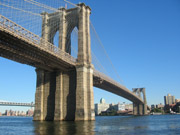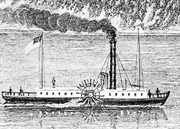Brooklyn. An independent republic within an independent republic. Varied, with a less frantic metabolism, and a physically and chemically palpable Dutch influence, it is almost like a second Manhattan. Not in terms of population or industry or tourism. But in terms of character and personality.
Brooklyn acts up, it doesn't surrender to the Manhattan vibe so easily. It tries to do its own thing. Which actually is the most Manhattan thing to do.

I too lived -- Brooklyn, of ample hills, was mine;
I too walk’d the streets of Manhattan Island, and bathed in the waters around it;
I too felt the curious abrupt questionings stir within me,
In the day, among crowds of people, sometimes they came upon me,
In my walks home late at night, or as I lay in my bed, they came upon me.
-Walt Whitman
Truth be told, Brooklyn was not much until Manhattan found it in the early 19th century. And even afterwards, it tried to differentiate itself from the other borough. In fact, Breucklen, as its Dutch settlers called it in honor of a town in Utretch, dances a perennial tango with Manhattan. It would seem it depends on Manhttan to know what to reject and who defined itself against.
Most of it was mainly farmland until the early 19th century. That's when a man called Robert Fulton (the generously called inventor of the steamboat) started running a regular steam ferry service. That was in 1814. By 1824, the property owners began to sell off plots for homes. Right from the start, it was considered an alternative to Manhattan.
At that point, it was considered a country retreat. But then the Brooklyn Bridge was made in 1883. The New York subway, in the early 1900s. Brooklyn lost its sense of exclusivity -- there were further bridges built in it -- there is the Williamsburg Bridge, which starts at the end of the Brooklyn Broadway (not as famous as the Manhattan Broadway, and with reason), which was made in 1904 and gave the Hasidic Jewish population the idea of moving into the neighborhood (which in turn made the German and Irish population leave).

Ever since that, Brooklyn has been the place where people who want to live or have lived in Manhattan move into. This population has the same attitude as those in Manhattan - they are just as independent and as autonomous. But since they are a different place with not as many commuunities of autonomous and indpendent people, nothing stops them. The hipsters that started to inhabit the borough in the early 2000s epitomize this. They reject mainstream (and what's more -and less, at the same time- mainstream than Manhattan?), but need it to exist in order to reject it.
Brooklyn doesn't have as many touristy spots. Its sights are inherent to the borough -- made by the borough for the borough -- and only happen to be interesting for tourists in a roundabout way.
Obviously, this is the coolest thing a borough can do. To happen to be interesting just by being the way it is. The Brooklyn cool is an indeniable trait. It's like the American Dream -- something to look for and to find when you least expect it.